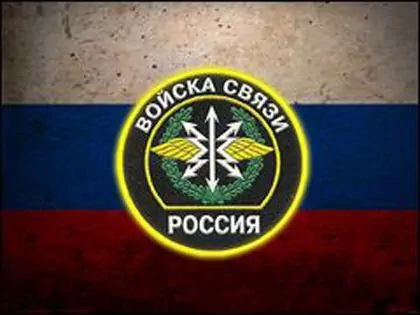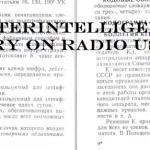Since the late 1970’s the monotone signal of UVB-76 aka The Buzzer and the messages in Russian that comes along with it had become popular among shortwave listeners, military enthusiasts and those who want to find grand mystery in everything they don’t comprehend. The mainstream media like BBC who recently published a very flawed and bogus article, despite known and published facts by our site and others, are third kind a people.
Surely an article connecting ” The Buzzer” uncritically with so called Dead Hand system, comparing it to MI6 Lincolnshire Poacher numbers station and even claiming it had connection with Russian Spy Ring of 2010 is part of sensationalist agenda that even respected news outlets like BBC produce on daily basis, written by people with doctorate education. Surely and article explaining this station as part of sophisticated, bit outdated military communications system for the Russian army would not generate so many clicks as the big bold caption about “big Russian mystery NO ONE cannot solve”
Is the signal on 4625 kHz a major mystery? Also known as UVB-76, UZB-76, MDZHB and ZHUOZ by its first phonetics, is this signal so mysterious and part of some major plot? Not according to those served in the Russian Armed Forces. While its very hard to get in touch with a person who has served at the unit that sends the “Buzzer” signal, we can find in the Russian internet many comments from ex army servicemen who served in units that had to use the “buzzer” signal, use the codes it send as well as other army stations.
We have gathered some of these citations from people who has served the Russian army from public Russian internet sources. We present them to you to better understand the purpose of the Russian military shortwave network, its signals and codes its sends. While we still doubt that this will completely cease many of the mainstream misconceptions they will serve the people willing to read and comprehend rather than making grand assumptions about things they don’t understand.
By Anonymous
Is that mysterious? Just a message on the radio, between VEVUS (Military Operation and Restoration Office of Communication – Transl.) and a subordinate military unit. “Tenacious Hawk” scrambles the units to the parade ground, sleepy officers run along with their bug-out bags.
They imply a nuclear attack. Next, the battalion commander receives direct orders – may it be a forced march in full gear (or even NBC suits) – until an “All clear” signal.
Such drills are conducted once in 6 months. In theory, the orders must be extracted from a sealed envelope stored in a special safe deposit – but the orders never changed. In order to keep up with the norms we’ve alerted the unit first, and opened the orders envelope second – when reporting to the battalion commander.
Different communications networks have different callsigns, instructions codes are contextually different for various agencies. GRU and FSB don’t rely on allegories – their codes are numeric. Motor rifles, space forces, engineers, paratroopers use bullshit like “Red Rustle”, “Tenacious Hawk” or “Smooth Raven”.
Was Granit-6 for nearly a year.
From Русская Энигма — самая мистическая радиотрансляция в мире.
By Pasklad
MONOLITHS (words coded into a phrase) are constantly changing. That means the same monolith could have different meaning over time. It’s not even a code – it’s an order. BROMAL could mean either combat readiness or an all-clear signal.
Those who served as signalmen or EW operators know what I mean.
From Русская Энигма — самая мистическая радиотрансляция в мире
By NDR631
It’s grinding my gears when someone calls this marker UVB-76! Journalists and not, can you comprehend than it’s a circular callsign of the station’s respondents? You wouldn’t call a ham operator TsShch (ЦЩ – Soviet/Russian equivalent of CQ Q-code – Transl.), because he calls CQ CQ CQ DE XXXX XXXXX!
The alarm system of Monolith is is a summation of equipment at all posts responsible for sending and receiving the messages of CCC (ЦБУ, Central Combat Control – Transl.) “Monolith”.
It’s mentioned in my “Radio networks of CCC”. The system of Monolith is reliable and not complicated. There is a toggle switch on the signalman’s post, that is switched around while receiving the urgency characters (levels designation – Transl.) (or prior to transmissions). By the switch of the “magic” toggle a red light-box with an ominous inscription “Monolith” starts to glow above the equipment room’s door. The alarm could also activate the screen for the communications shift supervisor and other superiors. Besides visual signalization, the alarm activates a voice recorder that tapes incoming and outgoing signals.
From: Военная “Жужжалка” на частоте 4625 кГц. “Buzzer” – УЗБ-76, МДЖБ, ЖУОЗ
By Desert Fox
- Every element (a center, a station) of the communications unit is given a designation which consists of «P» and a three-digit number:
P-100 – telegraph center (station);
P-200 – telepone center (station);
P-300 – channeling center (group);
P-400 – means of troops command automation center (group) ;
P-500 – information transit control center (group);
P-600 – receiving radiocenter;
P-700 – transmitting radiocenter;
P-800 – space communications center (station);
P-900 – electric power center (station)
Each battle post designation consists of BP and a three digit number, in which the first digit corresponds to the specific element of the communication network.
BP -010 – communication center control post;
BP -030 – communication security control post;
BP -090 – technical maintenance group;
BP -110 – telegraph center and cross-commutation control post;
BP -130 – telegraph terminal equipment room;
BP -210 – telephone center and cross-commutation control post;
BP -230 – intercom telephone switchboard post;
BP -310 – channeling center control post;
BP -350 – wire communication multiplexing post;
BP -360 – relay station;
BP -370 – tropospheric station;
BP -810 – space communication control post;
BP -850 – (de)multiplexing equipment room;
BP -880 – transceiving equipment room (space communication station);
BP -940 – electric power station.
If multiple communication network elements of the same type are in use, a serial number is added in front of their code name, e.g.: 1BP-110 … 7BP-110 and so on.
The designation of the communication center duty crews consists of letters “NDR” and a three-digit number in which two first digits correspond to the battle post, and the third digit is a serial number. “1” is assigned to the superior of a duty crew, and the rest is assigned to its other members.
Code names are assigned to all personnel of duty crews, e.g.:
NDR-111 – telegraph center (staion) sentry;
NDR-112 – duty technician of the post BP -110;
NDR-2-351 – duty crew chief of the post 2BP-350.
Some examples of code names assigned to equipment rooms:
- P-257К
BP-010 NDR-011,012
BP-310 NDR-312,313,314,315,316,317
- R-142Н
BP-710 NDR-711
- E-351А
BP-940 NDR-941
- R-409
1BP-360 NDR-1-361
- P-257-24К
2BP-350 NDR-2-351, NDR-2-352
The scanned equipment logbook made me laugh, page 82, “The Strait” – my father served there.
File 121.jpg, page 58 of the logbook, November 11th:
09:15 “diligent sower”
11:00 “irrelevant epilogue”
12:00 “depressing terrain”
13:00 “bloodless plume”
Obscure lyrics 🙂
From Военная “Жужжалка” на частоте 4625 кГц. “Buzzer” – УЗБ-76, МДЖБ, ЖУОЗ.
I am not arguing, it’s a duty… a wartime duty. But in the peacetime other countries were able to switch their armies enlistment to a contract basis. Russia is not poorer than the US, another question being they wanted to make a change, but we did not.
When my father was in the military academy (late 80s – early 90s) at the first class they were told – “You are ambitious future lieutenants. But keep in mind every American sergeant is better prepared than you in all senses”. I’ve see our conscripts, I was one. Excuse me, but they are just 18-19 years old kids. How can they defend anything, expect with their dead bodies like in 1941? What can they do to a 25-something meathead from US Army? They’re just a cheap labor and military force – that’s why conscription is still going on. An inability to gather 1 million contractors, too.
As for patriotism… In case the command 45 is announced (a real combat alarm, a sure war) contractors are notified on the premise of a drill. This is a decree by Serdyukov (Russian Defense Minister in 2007-2012). Guess the reason?
Imagine a messenger private at the doorstep of a contractor:
– Comrade lieutenant, the command 45 was announced in the unit. There are no restrictions. The personnel is receiving firearms and ordnance, the vehicles are rolling out of their storage.
– Understood, I’ll be right out.
The messenger leaves, and the contractor understand the real war has started and runs away. That’s why in the case of command 45 the personnel is gathered on the premise of command 145 (a drill). One colonel said “Don’t expect to gather these contractors otherwise”.
In a year of sitting at the colonel’s computer I’ve overheard a lot of information unavailable for officers below the rank of major. I conclude NATO thinking our army is a paper tiger is not for nothing.
By beztormozov
From: https://www.uralweb.ru/forums/messages.php?gid=56&id=48087
These were translations from public posts by people who had served in the Russian army and presumably know what they are talking about. For them as well as us the “UVB-76 the Buzzer” is part of the complex life of the Russian Army. Many aspects of it are still not known in detail. We hope these citations will help you to better understand the Russian military shortwave stations, their messages and their purpose.






